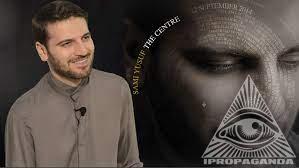
(2014) A Critique
U.K.-based singer-songwriter Sami Yusuf used to be known mainly as an Islamic pop musician (dubbed "the king of Islamic pop"). Still, he has transformed into a more secular figure with a spiritual bent. His new "spiritique" approach may be heard throughout "The Centre." Spiritique music is conceptualized as fusing spirituality with contemporary Western composition techniques. The music on "The Centre" is a nice mix of Middle Eastern folk and modern U.K. pop. The most extraordinary thing about this album is that it is slowly contagious; the songs stick with you and make you want to listen to them repeatedly.
Perhaps the album's contagious quality results from its well-balanced, alluring sound, upbeat atmosphere, and profound content. The album is deep, passionate, and genuine from the first track, "Pearl." Traditional and contemporary musical genres blend seamlessly from the very first track. It sounds pretty natural to mix western singing and instrumentation with traditional Middle Eastern instruments. Yusuf's singing style is roughly a hybrid of western and Middle Eastern traditions from the get-go. It's not easy to pull off such a mashup of genres without appearing cheesy, but Yusuf seems to have pulled it off.
The second track, "Fire," features a more upbeat tempo and a world music vibe. The lyrics have deep significance and powerful impact, despite their seeming simplicity. The song makes you want to sing along as if it were an international hymn for unity and friendship.
Initially, "Go" has a distinctly Western feel. Still, following the first repetition of the song's lilting chorus, notes reminiscent of Persian music can be heard in both Yusuf's voice and the instrumentation behind him. The song's structure, which allowed for beautiful transitions in melody, was the most impressive aspect.
On the other hand, the opening of "Khorason" has Middle Eastern instrumentation and the singer's contemplative supplication. Following two upbeat songs, this one allows Yusuf to let his feelings out.
It's incredible how good "Prism" is. The song looks to start out as a song from Yusuf's native Azerbaijan, with a foot-tapping tempo that is unmistakably middle eastern and vocals that are tuned to a more traditional manner of singing. The chorus, however, is unmistakably western in style.
At the outset of "Circle," an emotional guitar riff and a group vocal harmony set the tone. Even though the song sounds simple, it has subtle Middle Eastern drumming in the background. Yusuf seemed to take pleasure in stripping things away, exposing simply the raw passion in his singing.
With the introduction of "You," a more somber and gloomy tone sets in. This track combines electronic bass, Middle Eastern sounds, and a western-style chorus, and it's probably my favorite on the album. The song's words and accompanying music are both heartfelt and balladic. While most of the album's tracks are nonreligious, "You" features overt theistic lyrics.
The Centre, the album's namesake tune, begins with a blend of western-style singing, Middle Eastern rhythms, and the sonic suggestion of a synthesizer. The song has a warm fusion of instruments, with a guitar jumping in on the chorus and a Middle Eastern choir coming in after the initial singing round. It seems that the lyrics, which seem to have some connection to Sufism, are the main focus.
"Lament" is a song performed in Arabic with no trace of western influence in either Yusuf's voice or instruments. But even if someone doesn't understand Arabic, they will feel the sincerity of what is being said.
Back to English lyrics in "The Key," a middle-eastern melody rolls over from "Lament." The songs are beautiful and sung with a fantastic flight of notes.
"Jaaneh Jaanaan" follows the customary middle-eastern flavor from the last song. It seems like Yusuf intended for the album's first half to have a Western influence and the second half to have an Eastern effect. With that being stated, the song has a sorrowful yet uplifting tone, making it addictive in tune. The choir intervals are an excellent addition.
The last song on the album, except for the extra track of "Khorason" in Arabic, not English, is "Sari Gelin." It is a beautiful folk tune, performed quietly with subtleties. Yusuf's voice is the most essential part of the song. Still, other instruments like Middle Eastern percussion, guitar, a choir, and a santoor add to the sound.
Throughout his career, Yusuf has been exceptional at writing melodic melodies with purpose. I would say this is Yusuf's most heartfelt and earnest attempt thus far.
In an interview with Yusuf, he acknowledged that many people aspire to attain his level of accomplishment. He also remarked that fate brought him to the world of music, then hastily added, "I'm really grateful, Alhamdulillah."
